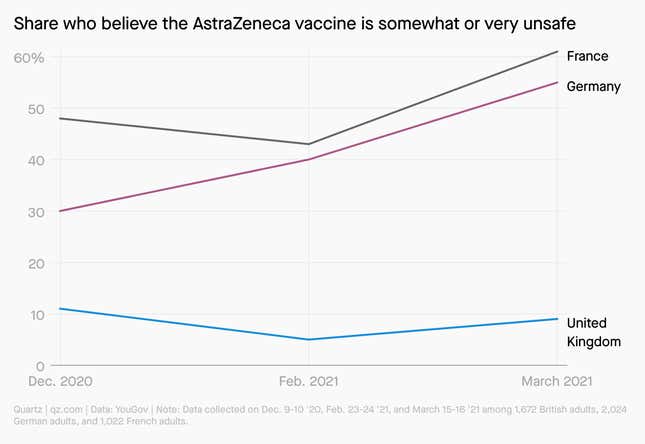Good morning, Quartz readers!
Here’s what you need to know
The US and UK sanctioned companies controlled by Myanmar’s military. The junta runs many aspects of the country’s economy.
Covax vaccine delivery delays leave Africa “helpless.” The head of the continent’s disease control agency warned of the cost to African lives and economies as South Korean production issues and EU and India vaccine nationalism have impacted global distribution efforts.
India launched its largest ever auction of coal mines. Sixty-seven sites are up for grabs, even as the country grapples with the environmental impact of its dependence on fossil fuel.
Zara deleted a statement about Xinjiang from its website. As foreign retailers come under fire in China for their comments on its human rights abuses, Inditex’s website has been scrubbed of a declaration against forced labor.
Pfizer began vaccine trials for children under 12. The company expects to have results by the end of 2021.
Beijing laid out some ground rules for digital currencies. China has already got a head start with its digital yuan, and now it wants to shape the international frameworks.
What to watch for

India braces for a nationwide strike. After four months of farmers’ protest at the borders of the national capital, Samyukta Kisan Morcha, the organization leading the demonstrations, has called for a shutdown from 6am to 6pm on March 26, appealing for all road and rail transport, markets, and other public places to remain closed across India.
Thousands of farmers have been protesting since November against the newly introduced farm law reforms, which they think will make them vulnerable and put them at the mercy of big corporations like Reliance Industries.
Charting the EU’s vaccine hesitancy
Europe’s vaccine program has been plagued by three different problems: Low supply, ineffective on-the-ground distribution, and vaccine hesitancy among the population. A recent poll found that trust in the AstraZeneca vaccine in particular has taken a hit in western Europe in recent weeks.

This is especially troubling given the EU is in the middle of a third wave of coronavirus cases. Annabelle Timsit explains what needs to be done to convince Europe that the AstraZeneca vaccine is safe.
How to launch a racial justice initiative at work
As Black workers in the US watched the killings of George Floyd and Breonna Taylor and Asian workers witnessed the shooting in Atlanta that claimed the lives of six Asian women, many felt spurred to action.
You don’t have to wait for executive support to start a racial justice initiative at your organization—just follow these steps:
Define your mission: Give yourself a tight deadline so you don’t get stuck spinning your wheels, and ground your mission in a cause that aligns with your organization’s own mission.
What about executive support?: Do your research, come prepared to answer questions and ease concerns, and make the larger framework clear.
Give yourself some credibility: This project isn’t a typical project, so don’t treat it like one: third-party credibility makes the project “real,” not just another internal corporate initiative.
Get others involved: Don’t confine your efforts to your office’s usual suspects of antiracism-minded employees—start dialogue with employees from all backgrounds.
Keep it going: Don’t lose momentum after a big win; keep your strategy flexible to new goals and projects.
✦ Looking to mobilize with coworkers to effect positive change at your workplace? Quartz’s field guide to building an antiracist workplace can get you moving in the right direction. If you’re not yet a member, try it out for free.
You asked about Covid-19’s origins
Why does it matter where Covid-19 came from?
“The more we can understand about how this [pandemic] happened, the better chance we have at stopping it from happening in the future,” says Rasmus Nielsen, a computational geneticist at the University of California, Berkeley.
But finding the virus’ origins could have massive geopolitical consequences. A spillover from animals to humans would mean that the SARS-CoV-2 happened naturally, and that scientists would need to work with public health officials to develop adequate pandemic preparedness. A lab origin, meanwhile, could mean that some individual or group may be to blame, and that could result in an upheaval of the way scientists research potential pathogens in the future. It could also damage China’s relationship with the rest of the world. Its government has been frustratingly opaque about information about the early days of the pandemic, and has failed to cooperate with global scientists’ efforts to get to an answer.
Katherine Ellen Foley has more on what we do and don’t know about Covid-19’s origins, and the real geopolitical and scientific consequences to finding the definitive answer.
Handpicked Quartz
🏙 How to make Africa’s cities more walkable, from Freetown to Nairobi
🚗 Three-wheelers, the punchline of the auto world, are finally having a moment
😷 The necessary—and the bizarre—Covid-19 habits Indians picked up a year since the lockdown
💸 One year since the world’s harshest lockdown, Indians want a “vaccine for poverty”
📈 The rise of inflation could throw spanners in Indian central bank’s growth plans
Surprising discoveries
A worker got his final paycheck in the form of 90,000 coins. It was only $915, but it took up a ton of space.
Octopuses might dream like humans. But their dreams only last for about a minute during active sleep.
One step closer to permanent night? The US is on the verge of researching how to block out the sun to combat climate change.
The pandemic has not been good for the paparazzi. One agency cited homebound celebrities and a legal battle with Meghan Markle among the reasons for its bankruptcy.
Rabbits dug up a 9,000-year-old Stone Age tool. The astonishing discovery has to be the cutest archeological site ever.
Our best wishes for a productive day. Please send any news, comments, coal mine bids, and bunny archaeologists to hi@qz.com. Get the most out of Quartz by downloading our iOS app and becoming a member. Today’s Daily Brief was brought to you by Niharika Sharma, Annabelle Timsit, Katherine Ellen Foley, Kya Muckle, Jordan Lebeau, and Liz Webber.
